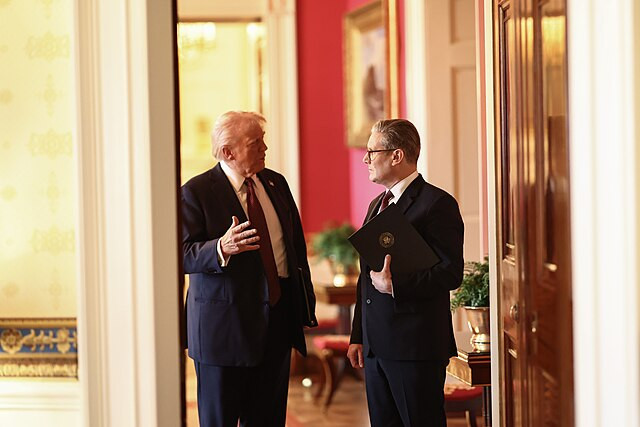President Donald Trump unveiled what he called a "full and comprehensive" trade agreement with the United Kingdom on Thursday, hailing it as a breakthrough in transatlantic relations. But the deal-announced after a month of negotiations-largely preserves the existing 10% blanket tariffs and offers only selective carve-outs for key U.K. exports, raising questions about its scope and significance.
The White House said the agreement reduces or removes tariffs on several categories of goods including automobiles, steel, aluminum, and agricultural products. Yet the overall tariff rate remains at 10%, unchanged from Trump's April 2 announcement.
Under the agreement announced by the White House and U.K. Prime Minister Keir Starmer, which both sides say will require further negotiation, the details include:
- Cars: 10% duty on up to 100,000 U.K. vehicles annually, down from an earlier 25% proposal.
- Aircraft Parts: Zero tariffs on British exports of Rolls-Royce engines and other components, in exchange for Boeing's expected order of 30 Dreamliner jets.
- Steel & Aluminum: Elimination of the 25% tariffs imposed in March, subject to future quota arrangements.
- Beef & Agricultural Goods: Reciprocal duty-free quotas on beef and other farm products.
"This does not provide the clarity necessary to lift the fog of uncertainty created by a trade war of choice," said Joe Brusuelas, chief economist at RSM, on social media. "A trade agreement where the details are still being negotiated is not an agreement."
Mr. Trump hailed the announcement on Truth Social as "a very big and exciting day," while Prime Minister Starmer, speaking via speakerphone at the Oval Office event, asked rhetorically: "Is it better than where we were yesterday?"
Wall Street responded positively, with U.S. equities rallying on hopes the accord signals a broader easing of the administration's global tariff regime. Yet University of Michigan economist Justin Wolfers observed, "Overwhelmingly the most important fact about today's trade deal is that the 10% across-the-board tariffs are staying."
Officials stress this is not a comprehensive free-trade agreement and will require congressional approval-a process that typically spans months or years. Any substantive U.S.-China discussions this weekend in Geneva, U.S. Treasury Secretary Scott Bessent said, will aim at mere "de-escalation," not a full pact.
British exporters account for roughly 3% of U.S. trade, and industry leaders caution the limited scope of the carve-outs may cap the benefits. Jaguar Land Rover welcomed the car quota, but noted it "could effectively put a ceiling" on competitive exports.
Even backers in London conceded the deal's symbolic value may outweigh its economic punch. As one British official remarked, an imperfect agreement "is better than no deal at all," underscoring the high stakes of maintaining the "special relationship" amid global trade tensions.






